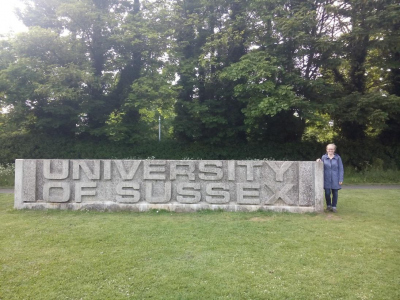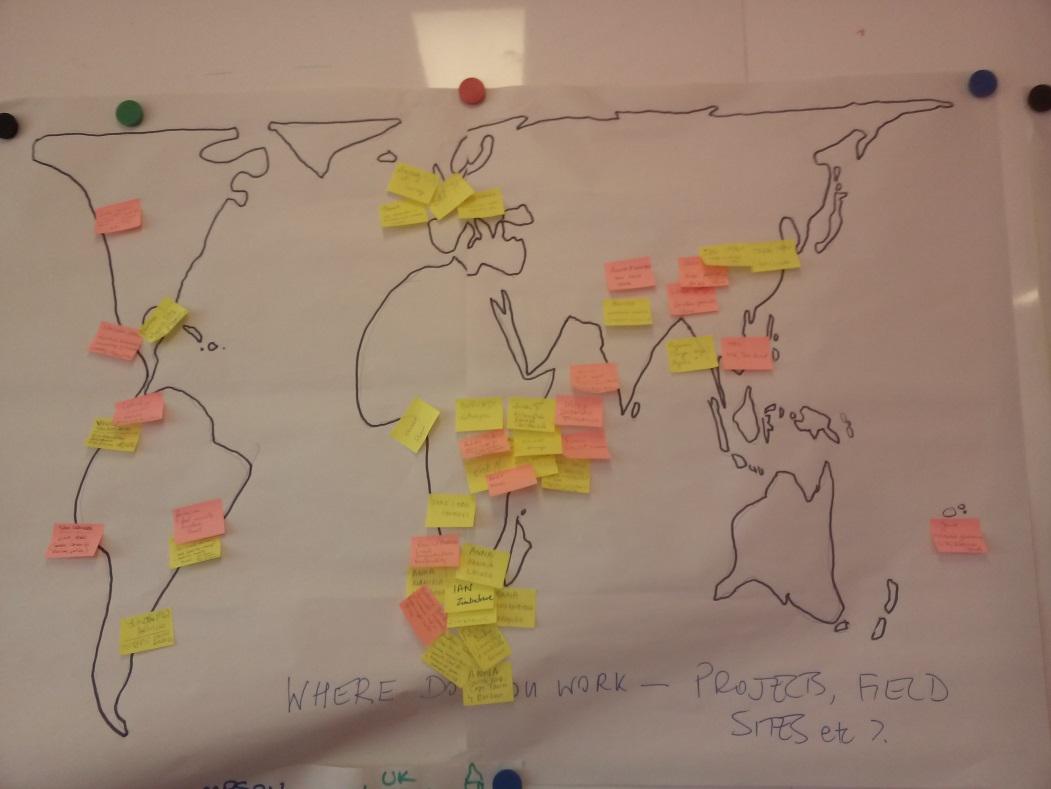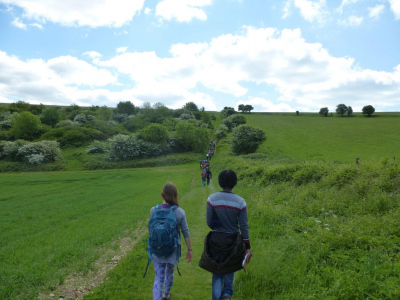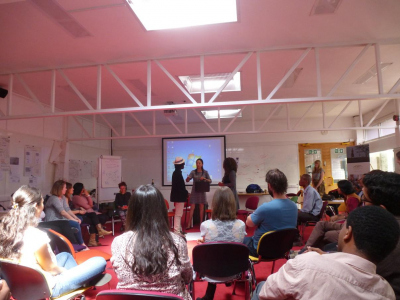Page path:
Janne Rohe
Report of GLOMAR PhD student Janne Rohe about her participation in the STEPS Summer School "Pathways to sustainability" at the University of Sussex, Brighton, UK, 16 - 27 May 2016
The summer school was convened by the "Social, Technological and Environmental Pathways to Sustainability Centre" (STEPS Centre), located within the Institute of Development Studies at the University of Sussex. The STEPS Centre is an interdisciplinary research centre that conducts research and policy engagement with partners in Africa, Asia, Latin America and Europe. It works across diverse themes (e.g. food/ agriculture/ water/ energy/ climate) to generate new thinking and acting towards sustainability. At the core of the summer school was the STEPS Centre’s "pathways approach". This approach links sustainability to environmental integrity and social justice, emphasizing the diversity of pathways that can lead to different sustainable outcomes. It recognizes that sustainability is a highly political matter – given that the framing of a certain problem or system depends decisively on who frames it and which knowledge, goals and values are taken as basis. The pathways approach therewith allows for a more nuanced understanding of plural and dynamic sustainabilities, providing space for alternative narratives and solutions that are elsewise often obscured by more powerful actors and institutions within sustainability policy and interventions.
This - at first sight rather abstract - approach was introduced during the summer school and throughout the two weeks course we used, conceptualized and dealt with it in many different ways. There were a number of lectures (e.g. on: "the politics of sustainability"; "resource politics"; "digital media, activism and sustainability"; "grassroots innovation/ innovation theory"; "climate governance") by renown professors of the University of Sussex. Yet, the centre piece of the course was a mix of very interactive sessions, case studies and methods including world cafes, open spaces, method cafes, role games, breakout groups as well as "walkshops" - longer discussions held on walks through the surrounding area. A great way to deal with complex topics outside a standard class room setting! It was this mix of interactive group sessions and discussions and the very diverse, international composition of the participants (35 participants from over 20 countries) that made the course so useful, inspiring and fun. Participants brought in examples from their own work, coming from very different disciplinary backgrounds and working across diverse regions on topics that all relate to sustainability and sustainable development.
My own research on marine governance in the South Pacific is closely linked to many sustainable development issues dealt with at the summer school. This includes topics such as resource politics, food security, social justice and climate change. The summer school was therefore extremely insightful and enabled me to link my work to a broader "sustainability picture". It further helped me to reflect on the origins of and drivers behind sustainability agendas and research – and to critically reflect on my own role as researcher. Also, I learned more about participatory research methods and "scholar-activism", meaning how we as researcher can also become active beyond the classic academic realm. Several follow-up activities as well as an interactive website for the alumni of the summer school are planned and I look forward to keeping in touch.
Overall, I very much appreciate having participated in the summer school. I can say that it not only enabled me to connect to a great network of international scholars working in a related field but also gave me further ideas for my own PhD, both in conceptual/ analytical and methodological terms. Therefore, I would like to thank GLOMAR for providing me with this opportunity. I can warmly recommend this course to other PhD students who would like to reflect on their own work from a differentiated sustainability perspective and get involved in a network of like-minded sustainability researchers.
This - at first sight rather abstract - approach was introduced during the summer school and throughout the two weeks course we used, conceptualized and dealt with it in many different ways. There were a number of lectures (e.g. on: "the politics of sustainability"; "resource politics"; "digital media, activism and sustainability"; "grassroots innovation/ innovation theory"; "climate governance") by renown professors of the University of Sussex. Yet, the centre piece of the course was a mix of very interactive sessions, case studies and methods including world cafes, open spaces, method cafes, role games, breakout groups as well as "walkshops" - longer discussions held on walks through the surrounding area. A great way to deal with complex topics outside a standard class room setting! It was this mix of interactive group sessions and discussions and the very diverse, international composition of the participants (35 participants from over 20 countries) that made the course so useful, inspiring and fun. Participants brought in examples from their own work, coming from very different disciplinary backgrounds and working across diverse regions on topics that all relate to sustainability and sustainable development.
My own research on marine governance in the South Pacific is closely linked to many sustainable development issues dealt with at the summer school. This includes topics such as resource politics, food security, social justice and climate change. The summer school was therefore extremely insightful and enabled me to link my work to a broader "sustainability picture". It further helped me to reflect on the origins of and drivers behind sustainability agendas and research – and to critically reflect on my own role as researcher. Also, I learned more about participatory research methods and "scholar-activism", meaning how we as researcher can also become active beyond the classic academic realm. Several follow-up activities as well as an interactive website for the alumni of the summer school are planned and I look forward to keeping in touch.
Overall, I very much appreciate having participated in the summer school. I can say that it not only enabled me to connect to a great network of international scholars working in a related field but also gave me further ideas for my own PhD, both in conceptual/ analytical and methodological terms. Therefore, I would like to thank GLOMAR for providing me with this opportunity. I can warmly recommend this course to other PhD students who would like to reflect on their own work from a differentiated sustainability perspective and get involved in a network of like-minded sustainability researchers.






